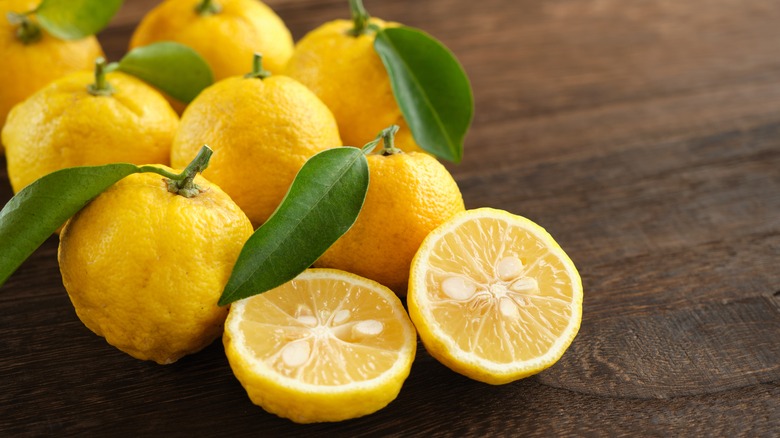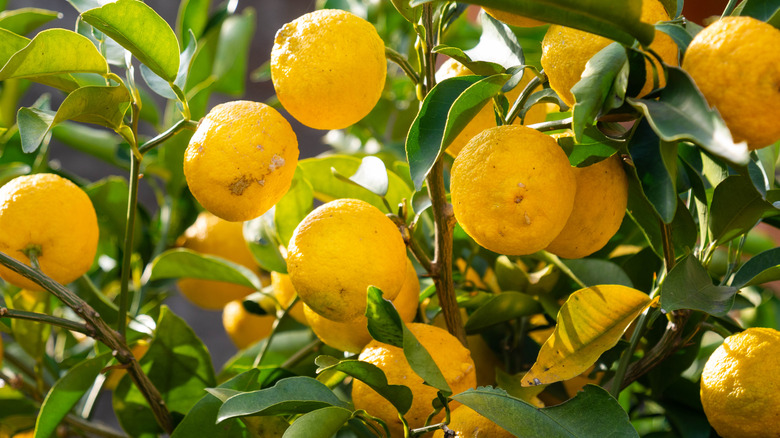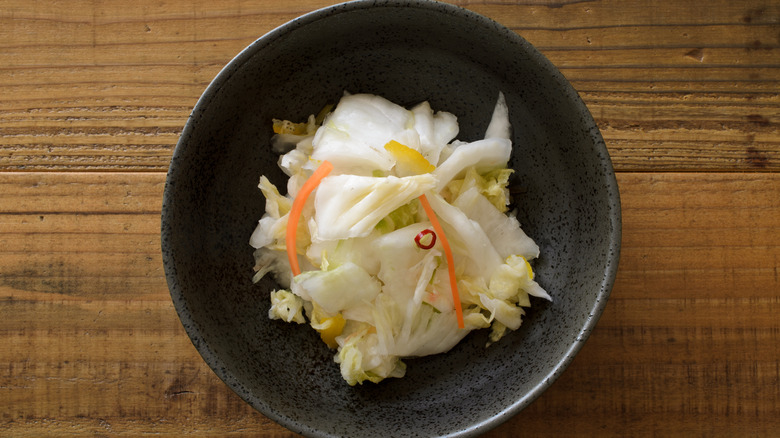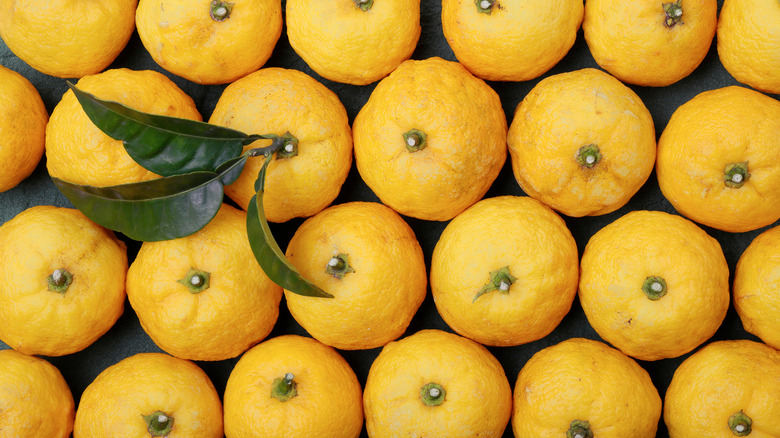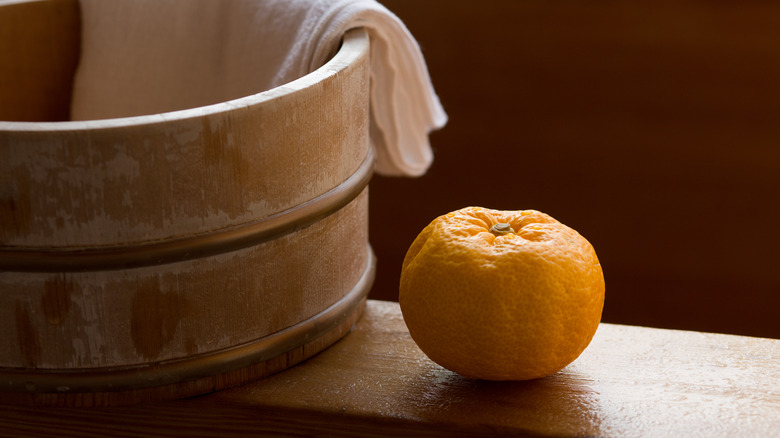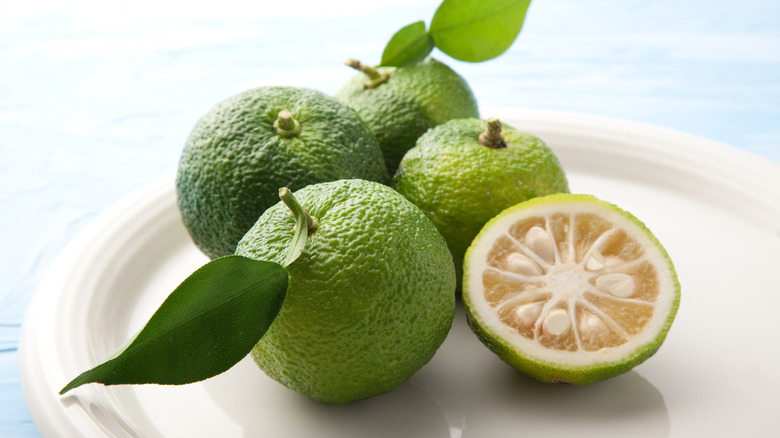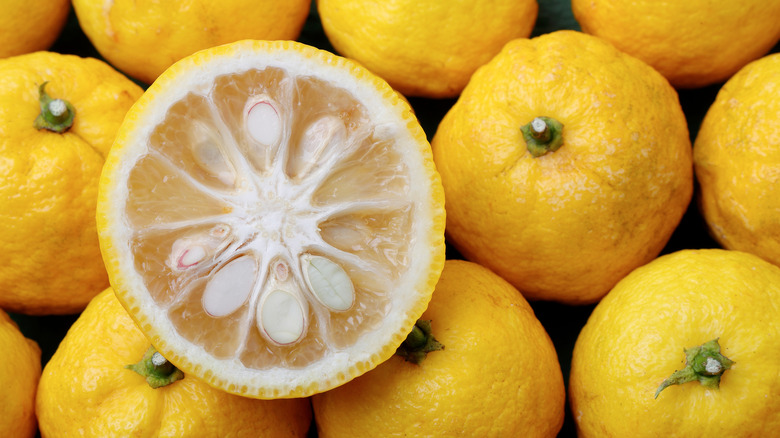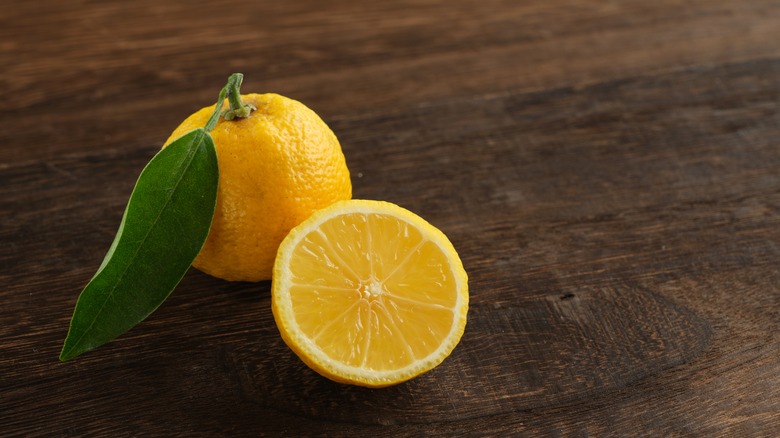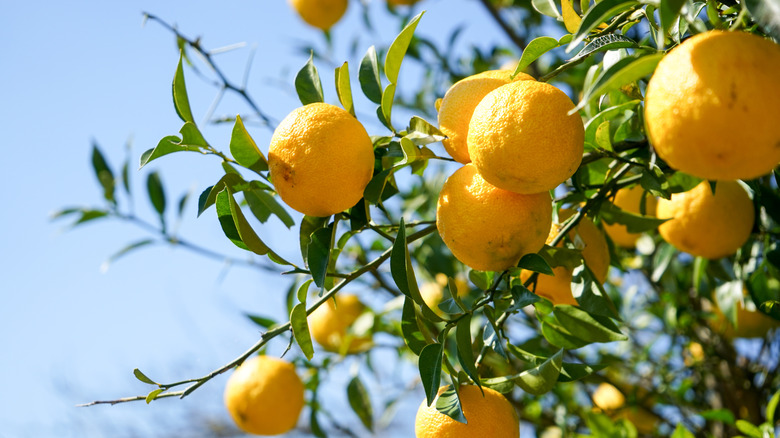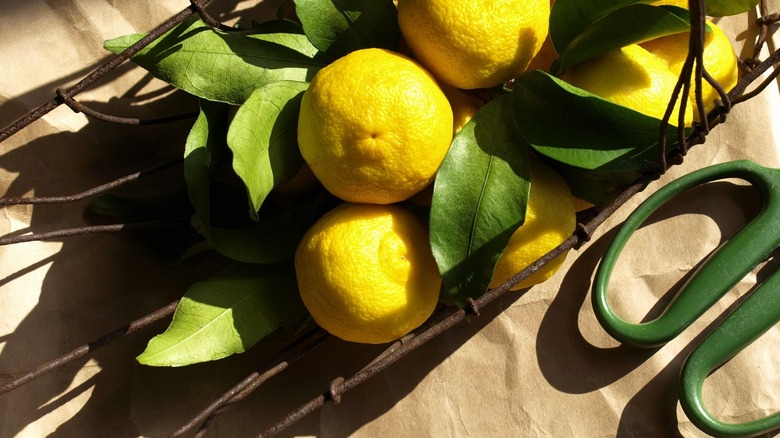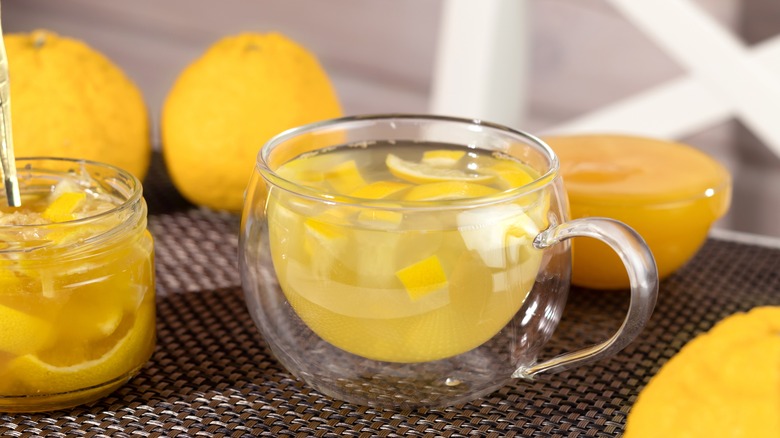Everything You Need To Know About Yuzu Fruit
You're probably familiar with fruits like strawberries, bananas, and apples. You may even be acquainted with some less well-known ones, like kiwi, papaya, and starfruit. But have you tried the yuzu or even heard of it?
If you have encountered yuzu, it was likely in teas or bath products. That's because the fruit can't be imported into the United States for fear of spreading agricultural diseases. Fortunately, it is grown domestically in citrus-friendly regions like California's San Joaquin Valley.
The yuzu fruit is small, typically the size of a golf ball, and rarely grows larger than a tennis ball. It has bumpy skin and large seeds and is believed to have developed as a hybrid of mandarin and another Southeast Asian citrus known as the Ichang papeda. Because of its somewhat bitter taste, the skin and juice are typically used in soups, dressings, and home and body goods. But what else is there to learn about this citrus fruit? Here's everything you need to know about yuzu.
It's a citrus fruit
Yuzu is a citrus fruit that is traditionally grown in China, Japan, and Korea. It's highly fragrant but sour, lending it to use in cooking, baking, and aromatics. The fruit is most commonly used in Japanese cuisine. And while it may resemble lemons or citrons, yuzu is not related to either fruit. It's an entirely different type of citrus that produces less juice and more seeds than other varieties.
While it's ripening on the tree, the fruit is green. Even when ripe, it looks a bit like an oversized and lumpy lime that has perhaps seen better days and is best mixed with something sweet to counter the sourness of the fruit.
Because of its sour flavor, yuzu isn't often dried, frozen, cooked, or preserved. However, it works beautifully in sauces, baked goods, and candies and can also be juiced and used in cocktails and smoothies. Yuzu fruits will keep for a week on the counter or a couple of weeks longer in your refrigerator.
It's featured in Japanese cuisine
Yuzu fruit originated in China but it's now grown in a variety of other nations, including Korea, Australia, the United States, and France. It also grows in Japan, where the fruit was initially consumed as medicine. Despite its holistic beginnings, yuzu is now a staple of Japanese cuisine. Japan produces 27,000 tons of yuzu each year and even held a tasting for the fruit in France in 2011. Thanks to that bit of marketing, buyers from 20 countries ordered yuzu. The following year, 30% of the yuzu fruit grown in Japan was exported to other countries.
Japan's Kochi Prefecture produces over 50% of the world's yuzu, despite being home to only 2,000 people. While other regions export hundreds of yuzu fruit that will be turned into ponzu (a citrus-flavored sauce) or juice, the ones grown in and shipped from the Japanese town of Monobe are blemish-free beauties that can be used intact. The juice is used to make vinegar, while the rind can be frozen for up to a year.
Yuzu may help your eyes
WebMD suggests that the vitamin C found in yuzu can help promote better eye health. This is particularly significant with an age-related macular degenerative disorder, which can lead to vision loss. You can take supplements to ensure adequate vitamin C but getting it from foods your body can digest appear to be more efficient at preventing conditions like cataracts, as per a 2016 study published in Opthalmology.
Sufficient vitamin C might also help to prevent cataracts by increasing the amount of eye fluid, which aids in preventing the oxidation that encourages cataract development, as per WebMD. In other words, the antioxidant properties of fruits and vegetables containing vitamin C help prevent or postpone the development of cataracts.
While the study didn't look at healthy people who had not yet developed the disease, they did find that it helped lessen the effects of the later stages. But don't simply ingest mass quantities of vitamin C. The body typically eliminates excess vitamins anyway, and having too much in your system could lead to abdominal pain, diarrhea, and vomiting, as per the National Institutes of Health.
It may boost immunity
Your eyes aren't the only thing a daily dose of yuzu is good for. The fruit could also help boost your immunity. Besides the vitamin C and antioxidants that may make you more resistant to common diseases like the flu and colds, the fruit contains essential oils that could be invaluable. Soaking in a yuzu-infused bath is believed by some to help protect you against diseases, as per Everyday Health. Try placing two whole yuzu fruits in hot water to create a yuzu bath, cutting them to get more essential oils out of the experience.
When it comes to baths, many argue that the fragrance of this fruit is as important as its taste, if not more so. Of course, snacking on some in the bath isn't such a bad idea, as yuzu fruit contains antioxidants that can help fight free radicals that cause oxidative stress, as per Clinical Interventions in Aging.
It can reduce stress
According to the Journal of Alternative and Complementary Medicine, it isn't eating this tiny citrus fruit that gives you the stress relieving benefit. Instead, it's all about smelling it. When comparing the effects of sniffing water spiked with yuzu and plain water, the study's researchers determined that the fragrance of yuzu had a markedly calming impact on female participants.
The anxiety-reducing effects of this action appeared to last for up to half an hour after the yuzu-inhaling experience. This study also showed an increase in vigor and a decrease in fatigue reported among study subjects.
The best and perhaps the most traditional way to get the benefits of aromatic yuzu is with a yuzu-infused bath, but you can still get the benefits of this citrus via candles, soaps, lotions, and room sprays if you only have a shower. Plenty of creative ways exist to add this de-stressing aroma to your home.
Consuming yuzu may improve memory
Tests conducted using yuzu extract determined that ingesting this fruit may help prevent memory issues, as per a 2013 study published in the Journal of Nutrition. This was most significantly noted in testing conducted on rats that showed increased short-term memory in those exposed to yuzu.
A 2022 study showed significantly improved general and visual memory scores in participants under 74 who received citrus extracts (via Nutrients). Of note was the relationship between glycemic index, diabetes, and memory loss. This is where yuzu has its most significant impact in terms of memory. Studies showed that after eight weeks of introducing yuzu to a participant's routine, glucose levels decreased, leading to weight loss and improved cognitive function.
There is also evidence that citrus fruits reduce disruptions in the circadian cycle, which tend to occur more often in older individuals, and those most likely to be afflicted. Lack of sleep caused by these disruptions can contribute to cognitive decline. You should add yuzu to your routine if you haven't already by age 65.
It is said to bring good luck
Soaking in a bath with yuzu is believed to bring good luck. In fact, the practice is often associated with celebrating the winter solstice. The tradition is believed to trace back to the arrival of Buddhism in Japan and is connected with the history of public baths known as sento.
The tradition of soaking in a bath with yuzu fruit, often referred to as yuzuyu, is one people still rejoice in today in Japan and beyond. Folk beliefs maintain that it will not only ward off seasonal illness, but it might beat back bad spirits and ill fortune.
The best news is that this aromatherapeutic delight can be used more than once. If you use nets to retain your yuzu, as many Japanese spas do, you can use the same fruit for two to three days. Even if you don't plan to reuse your fruit, this little trick will make collecting the fruit out of your bath more manageable.
It can be used when yellow or green
A yuzu tree can take up to 15 to 20 years before it's ready to produce fruit. Of course, that plant must flower, grow fruit, and ripen before you can use it. But just how ripe it has to be is open to some debate.
When the yuzu fruit is fully ripe, it is yellow, but it can be used when the fruit is still green. Green yuzu will be much tarter than the fully mature, yellow fruit. Because yuzu is harvested in the fall, it stands to reason that the green variety would be available earlier in the year. This means you're best off looking for green yuzu in the summer. Green yuzu creates a kaffir lime sort of flavor, with peppery and piquant notes. Fully ripe yellow yuzu is challenging to locate in most western markets, however, while the green, not-quite-ripe variety can be almost impossible to find outside Japan. Try finding specialty markets or turning to yuzu juices if the fresh stuff is out of reach.
Yuzu can get expensive
Yuzu fruit is tricky to procure, as it grows only in certain regions and the trees take a long time to mature and produce fruit. Moreover, yuzu is experiencing more demand than supply since it is becoming trendy to use in foods, drinks, and fragrances. That demand is driving up the cost of these little gems. Part of the reason is its regional production. Most Japanese yuzu varieties are grown for juice, while the Korean variety is used predominantly for preserves and teas.
The size of the fruit also plays a significant role. Australian restaurateur Deborah Sillaots told ABC News that a 20-liter bucket of yuzu fruit produces only 750 milliliters of juice. She was also paying $100 per bottle to import it to use in her cocktails. Eventually, she learned her farmer neighbors were growing yuzu and so saved considerable money by teaming up with them to source the fruit.
Yuzu fragrance is popular
Unsurprisingly, yuzu fragrance is used in sprays, candles, and perfumes, as are many of its citrus brethren. But this one reportedly has stress-relieving benefits, too. It's often combined with grapefruit or bamboo. The fruit's scent is often described as a complex blend of sweet, bitter, and tart notes that make it popular for refined applications.
There are also notes of bergamot and lime in authentic and manufactured yuzu fragrances. Some recognizable perfumes that incorporate this unique scent include Versace Bright Crystal, Eau de Cartier, and Dali Wild.
The fruit is also powerful enough when it's refined that it can be used to perfume foods rather than flavor them. As chef Gregory Brainin told The New York Times, "It has an amazing floral citrus fragrance – you can smell it from across the room." He serves a scallop dish with yuzu juice misted onto it tableside with an atomizer.
It is low in calories and high in vitamins
If you're looking for a highly nutritious food that won't overdo it on calories, it's hard to go wrong with yuzu. A 2014 article published in the journal Food Reviews International explains that a yuzu fruit has just 53 calories, 13 grams of carbohydrates, and 0.3 grams of fat. But the tiny fruit packs a mighty punch, containing 1.8 grams of fiber. What's more, yuzu also contains over half the daily recommended intake of vitamin C. This vitamin helps produce collagen, as per the Orthopaedic Journal of Sports Medicine. Meanwhile, it may well help to boost the immune system and can help alleviate common ailments like muscle weakness, stiffness, and joint pain.
And one little yuzu reportedly contains about three times the vitamin C of a lemon. It also contains limonene and limonoid, both of which are possible cancer-suppressing agents, as per Chemistry Central Journal.
It may help with bone strength
Like other citrus fruits, yuzu has been shown to strengthen bones in animal studies. Researchers are hopeful yuzu fruit can be used to prevent age-related bone loss. According to Dr. Yoshifumi Kimifira, this is the result of collagen-derived peptides.
Though his studies are still in their infancy, Dr. Kimifira proposes that limonoids in the peel and seeds of the yuzu can benefit bone growth. The limonoid present in the fruit has already been shown to help bones. He also believes Nomalin may aid in the prevention of osteoporosis.
There has been some evidence in Dr. Kimifira's early animal studies that the fruit can help prevent bone loss over time. And because yuzu is traditionally used just for the juice, the seeds and skin typically go to waste. The researchers have created a way to turn these unused items into a paste, thus eliminating the waste and potentially helping keep bones strong, even in a person's later years.
It is in season from September through December
When your yuzu fruit is in season depends on how you want to use it. The white flowers begin to appear on the tree from April to May. From June to August, those blossoms turn into green fruit. Since green yuzu is edible, with an almost spicy flavor, you can pick and eat it during the summer.
If you are like most consumers and want to eat yuzu when it's fully ripe, you'll need to wait a little longer. From November to December, yuzu turns the golden yellow most often associated with the fruit. At this point, it can be picked for use in yuzu baths, any number of dishes, or as a fragrance. Popular food applications include preserves, tea, and as bright accents for other dishes. For an easy way to enjoy this fruit, try simply mixing yuzu marmalade with hot water quickly to transform it into a fragrant, delicious tea.
It may help improve blood flow
Consuming citrus products can help prevent heart disease and strokes, as compounds found in citrus can keep blood platelets from clumping together and forming clots. According to Food and Chemical Toxicology, yuzu, in particular, contains naringin and hesperidin, two compounds known to have this anti-platelet effect, along with certain flavonoids in the peel.
Scientists were inspired to study the effects on humans after seeing positive anti-platelet results in rats (via Biomolecules & Therapeutics). Ethanolic yuzu extract was tested in humans, where researchers found that it could interrupt the processes responsible for clumping platelets and creating blood clots.
This effect is important for those who are at high risk for cardiovascular disease, including patients who have suffered strokes or may be at risk of one. It could be an excellent option for people who are sensitive to blood thinning pills and other treatments, like Tylenol.
Yuzu may reduce inflammation
Additional studies show results that hint that yuzu and other citrus fruits might also help to reduce inflammation. The Journal of Food Science points out that the limonene in yuzu helps prevent cytokine formation and inhibits inflammation in bronchial tubes, which can cause asthma. It also revealed that citrus fruit peels, especially yuzu, contain limonene. Researchers found that 62% of the essential oils produced by the yuzu were limonene, which showed no signs of in vitro toxicity. This essential oil is what aids in reducing and preventing inflammation.
In addition to asthma and inflammation associated with injury and arthritis, limonene can help address inflammatory bowel disease (per Journal of Oleo Science). Extract from the yuzu peel suppresses inflammation and oxidative stress that can lead to conditions like ulcerative colitis. This is particularly helpful for those with this ailment who could suffer side effects from the commonly prescribed medications.
